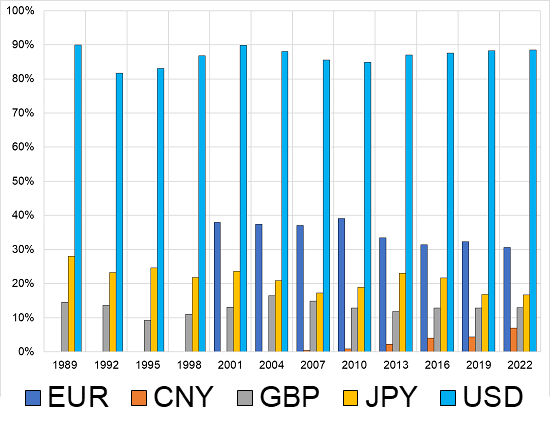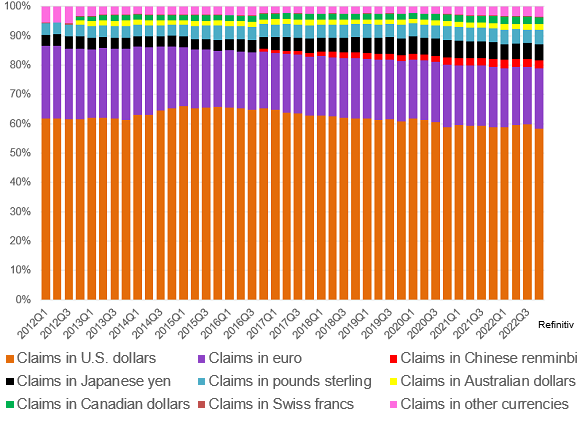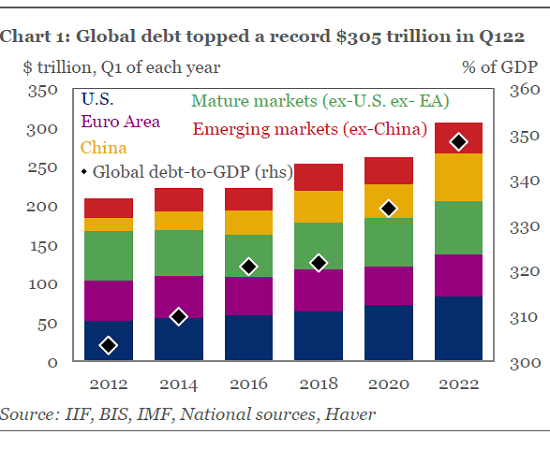Everyone's Talking about Currencies: 21 Points
July 24, 2023
The ideal 'sound money system' is one in which many currencies, both state-issued and privately issued, compete in a transparent global marketplace.
Everyone's talking about currencies, but often without much context. Here are 21 points about currencies that it's good to keep in mind during any discussion. Richard Bonugli and I discuss these in our latest
podcast on currencies (29:36 min).
1. Currencies are the foundation of a nation's economy and financial system. History may offer examples of currency collapses benefiting the few, but there are no examples of currency collapses benefiting the many.
2. Ultimately, every currency reflects (i.e. is "backed" by) the economy and institutions of the issuing nation. Nations with diverse, adaptable, productive economies with deep, transparent markets have the means to pay interest on their bonds and offer productive investments for other nations holding surpluses of their currency.
The meme on fiat currencies is that they're "backed by nothing." But currencies issued by nations / central banks that issue interest-bearing bonds are backed by the interest-bearing bonds.
3. Governments jealously maintain the sole privilege of issuing the currency so they can inflate (i.e. reduce the purchasing power) of the currency at will to make it easier for debtors to pay down debts. This benefits governments which are debtors and the banking / financial sectors which profit from lending and leverage.
4. The collapse of a currency destroys the central state's ability to issue debt to fund its functions. Governments will always try to maintain the currency while debasing it as a means of maintaining a status quo that benefits elites at the expense of the many.
5. Currencies reflect financial repression: central banks' suppressing interest rates / bond yields and excessive money creation weaken currencies by making the currency less attractive to global capital.
6. When currencies lose purchasing power via inflation, everyone forced to hold the currency loses out: their labor buys less and the value of their money declines.
7. There is a class dynamic to this process: the wealthy have the means to transfer their wealth to other currencies or assets that retain their purchasing power, the commoners have fewer means to do so.
8. Financial repression that reduces the purchasing power of the currency exacerbates wealth inequality, as the wealthy are able to use credit and leverage to buy assets that are inflating in central bank generated credit-bubbles. Roughly 90% of income-producing assets are owned by the top 10%.
9. As a currency crisis looms, the wealthy transfer their assets overseas to escape capital controls. After the currency is devalued and assets have crashed in value, the wealthy return to the domestic economy and scoop up assets at fire-sale prices.
10. There is a lot of hype and hope around gold-backed currencies, but these are only truly sound money if the currency can be converted to gold. Without conversion, a "gold-backed currency" is still under the control of a government that will use the currency to benefit the few at the expense of the many.
11. In other words the problem isn't the currency being backed by a commodity, it's the government / central bank control of the currency that's the problem, as the central state manages the valuation and conversion to its own benefit. "Backing" a currency in name is meaningless without a means for those holding the currency to convert it directly into the commodity.
12. Compare using gold directly as money with a "gold-backed currency" that isn't convertible to gold. The gold coin has intrinsic value; the value of the "gold-backed currency" is controlled by the government / alliance issuing the currency.
13. The vast majority of money is created by issuing credit, both public and private. If a currency is "backed by gold" at a set valuation, what happens when the money supply expands due to credit issuance?
14. Currencies can be viewed as competing means of exchange and stores of value. Those currencies that have been issued globally in quantity are the easiest to use for exchange because they're the most liquid. Those currencies whose valuation is established by the marketplace are more trustworthy than those arbitrarily pegged by governments.
15. As stores of value, currencies' valuation is based on the yield of the bonds issued by the state issuing the currency. Higher yields, a stable state and a diverse, adaptable economy offer capital a lower risk profile than unstable governments and weak, brittle economies dependent on commodities or exports.
16. Triffin's Paradox is that a currency cannot serve both its domestic economy and the global economy equally well. To provide the global economy with sufficient liquidity to hold as reserves, the dominant reserve currencies must run sustained trade deficits to "export" their currency into the hands of those needing the currency for trade or as reserves.
17. The reason why the world abandoned the gold standard is that trade imbalances led to importers' reserves of gold being drained as exporters demanded payment in gold, i.e. they demanded the trade deficits be settled in gold: we demand the currency that we hold from trading with you be converted into gold.
18. Gold as currency only works if trade balances, i.e. surpluses and deficits, are extremely modest. This is a problem in a global economy with mercantilist nations who structure their economies to run massive trade surpluses and exporters of commodities (such as oil) that run massive trade surpluses.
19. Mercantilist nations need to keep their currency weak enough to encourage the exports that generate their growth. Nations seek to intervene in currency markets / manipulate their currency to support their domestic economic policies.
20. Nations want to control the value of their currency to support their domestic economies' mercantilist structure, but this means running trade surpluses and keeping their currency weak. Neither serve the interests of other nations seeking places to park their excess foreign currency.
21. Currencies are intrinsically bound to trade, domestic economic policies, market forces and the limitations of the issuing nations' fundamentals: is their economy open, with deep, transparent markets? Is it diverse, adaptable, stable, with plenty of opportunities for holders of its currency to invest and know they can get their money out without hindrance? Do their financial systems operate in a predictable fashion with ample liquidity, or are they prone to liquidity crises and unexpected capital controls or policy reversals?
The ideal sound money system is one in which many currencies, both state-issued and privately issued, compete in a transparent global marketplace. In other words, a system in which participants decide what they value as sound money, liquid means of exchange, etc. in a wide-open marketplace outside the control of governments, alliances or any centralized power node.
I have long favored adding a Labor-Backed Cryptocurrency that is both a means of exchange and a store of value to the mix. I explain the benefits of such a non-state global currency in my book
A Radically Beneficial World: Automation, Technology and Creating Jobs for All.
Richard and I discuss these currency-related topics in
The Roundtable Insight Vision Series: Currencies with Charles Hugh Smith (29:36 min).



 My new book is now available at a 10% discount ($8.95 ebook, $18 print):
Self-Reliance in the 21st Century.
My new book is now available at a 10% discount ($8.95 ebook, $18 print):
Self-Reliance in the 21st Century.
Read the first chapter for free (PDF)
Read excerpts of all three chapters
Podcast with Richard Bonugli: Self Reliance in the 21st Century (43 min)
My recent books:
The Asian Heroine Who Seduced Me
(Novel) print $10.95,
Kindle $6.95
Read an excerpt for free (PDF)
When You Can't Go On: Burnout, Reckoning and Renewal
$18 print, $8.95 Kindle ebook;
audiobook
Read the first section for free (PDF)
Global Crisis, National Renewal: A (Revolutionary) Grand Strategy for the United States
(Kindle $9.95, print $24, audiobook)
Read Chapter One for free (PDF).
A Hacker's Teleology: Sharing the Wealth of Our Shrinking Planet
(Kindle $8.95, print $20,
audiobook $17.46)
Read the first section for free (PDF).
Will You Be Richer or Poorer?: Profit, Power, and AI in a Traumatized World
(Kindle $5, print $10, audiobook)
Read the first section for free (PDF).
The Adventures of the Consulting Philosopher: The Disappearance of Drake (Novel)
$4.95 Kindle, $10.95 print);
read the first chapters
for free (PDF)
Money and Work Unchained $6.95 Kindle, $15 print)
Read the first section for free
Become
a $1/month patron of my work via patreon.com.
Subscribe to my Substack for free
NOTE: Contributions/subscriptions are acknowledged in the order received. Your name and email remain confidential and will not be given to any other individual, company or agency.
|
Thank you, blacksail ($5/month), for your marvelously generous Substack subscription to this site -- I am greatly honored by your support and readership. |
Thank you, Carl S. ($5/month), for your splendidly generous pledge to this site -- I am greatly honored by your steadfast support and readership. |